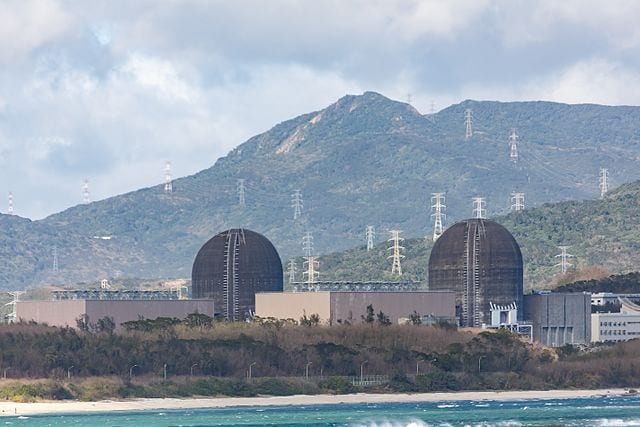In a referendum held alongside local elections, the Taiwanese electorate voted overwhelmingly to abolish a stipulation in the country’s Electricity Act that called for all nuclear energy-based power-generating facilities to completely cease operations by 2025.
Many experts considered it a surprising victory for pro-nuclear activists. In January 2016, Taiwan’s Democratic Progressive Party garnered widespread support in elections, running on a platform that included the elimination of nuclear power by 2025. After the election, leaders quickly passed an amendment codifying the nuclear phaseout.
However, a blackout on August 15, 2017, apparently helped change many people’s views on nuclear power. The outage occurred when a contractor accidentally interrupted the gas supply to the 4,384-MW Tatan power station, Taiwan’s largest gas-fired plant. The interruption caused all six units at the site to shut down, and 6.6 million households and businesses across the island lost power for more than five hours. At the time, three of Taiwan’s six then-operational nuclear reactors were offline for maintenance. The lack of sufficient reserve power left Taiwan Power Co. in the lurch, unable to make up for the sudden shortfall.
Nuclear power has provided about 17.5% of Taiwan’s electricity over the past 20 years, although that percentage decreased to only 9.3% in 2017. According to the International Atomic Energy Agency, two reactors at the Chin Shan facility were permanently shut down on October 3. Four reactors remain operational: two 890-MW units at Maanshan (Figure 1) and two 948-MW units at Kuosheng.
 |
| 1. Taiwan’s Maanshan nuclear power plant. Courtesy: CEphoto, Uwe Aranas |
Construction began on two 1,300-MW units at the Lungmen facility in 1999. However, Taiwan’s governing party agreed to halt construction of the plant on April 30, 2014, due to anti-nuclear public sentiment. Unit 1 was complete and undergoing pre-operational testing at the time, while Unit 2 was reported to be more than 90% complete. More than $ 9 billion had been invested in the project, which was never connected to the grid.
World Nuclear News reported that getting the latest referendum on the ballot took great effort from pro-nuclear activists. Petitioners had to deliver 2,000 signatures to the Central Election Commission (CEC) in March before permission could be given to gather more signatures, which was not granted until July. Then, organizers delivered 315,000 signatures in early September, but the CEC rejected enough of them to put the measure in jeopardy.
Pro-nuclear activist Shih-Hsiu Huang, co-founder of Nuclear MythBusters—an internet-based group that calls itself “the nuclear energy rumor terminator”—began a hunger strike in protest of the CEC’s rejection. However, on September 19, after 140 hours without food, he was hospitalized with high blood pressure and a fast heartbeat. It wasn’t until October 17, when the Taipei High Administrative Court ordered the CEC to accept additional signatures that had been submitted on September 13, that the referendum was assured of receiving a vote.
Yet, on November 24, 5,895,560 votes were reportedly cast in favor of removing the nuclear phaseout clause from Taiwan’s Electricity Act, while 4,014,215 voted to retain it. A minimum of 5,000,000 votes was required for the referendum to pass.
With the vote successful, Huang indicated his group would ask the government to restart non-operating reactors and extend the lives of other units.
—Aaron Larson is POWER’s executive editor (@AaronL_Power, @POWERmagazine).
The post Voters Back Nuclear Power, Phaseout by 2025 Nixed appeared first on POWER Magazine.